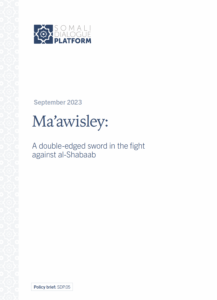Introduction
One of the most significant recent developments in the prolonged struggle against al-Shabaab in Somalia has been the success of military operations led by the Somali National Armed Forces and allied self-defence militias known as Ma’awisley. Ma’awisley—named after the colourful sarong many members wear—were provoked into action by various grievances towards al-Shabaab, including high taxation, forcible child recruitment and continued intimidation. The offensive, which started in mid-2022, has led to significant swathes of territory in central Somalia being recovered. This is the first time in almost a decade that al-Shabaab has faced military pressure sufficient to threaten its hold on the country’s rural areas.
So far, Ma’awisley militias have emerged primarily in the states of Hirshabelle (east of the Shabelle River) and Galmudug. This area, designated as phase one of operations, has been the focus of the offensive to date. Only two phase one districts—Galhareeri and Eelbur in Galgadud region of Galmudug state— remain under al-Shabaab’s control, with the group dislodged from almost all the territories where Ma’awisley militias have been formed. The formation and role of Ma’awisley from these territories may, however, have serious implications in terms of wider security sector reform; implementation of a revitalized National Security Architecture; securing the gains made in newly recovered territories; as well as, more broadly, state-level political settlement dynamics. This prompts the critical question of what is to become of Ma’awisley from these territories when the military offensive moves on to other parts of the country.
This policy brief analyses the political-security challenges posed by Ma’awisley, before turning to the policy options around demobilization and integration of the militias.
This briefing is a product of the Somali Dialogue Platform.The Somali Dialogue Platform is a programme which supports Somalis to achieve consensus on contentious political issues and is implemented by the Rift Valley Institute. The Somali Dialogue Platform is funded by the UK Foreign, Commonwealth and Development Office (FCDO), the Ministry of Foreign Affairs of Denmark, and the United States Agency for International Development (USAID).




